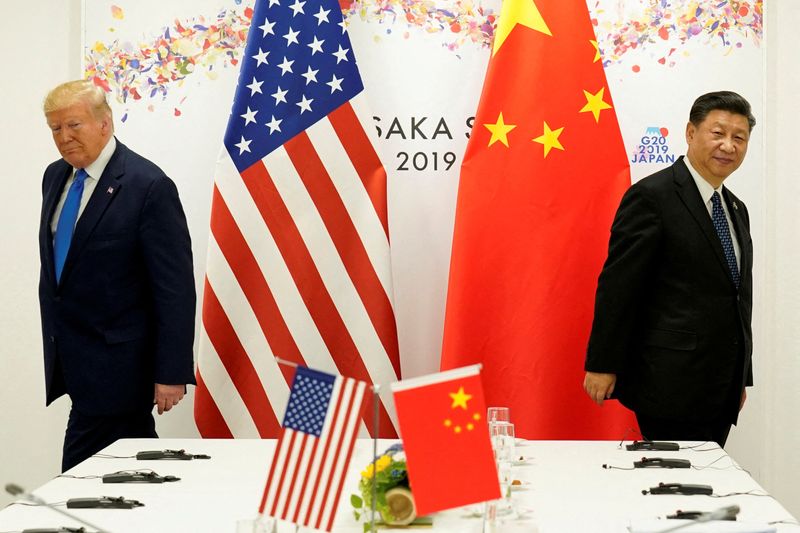By Antoni Slodkowski, James Pomfret and Laurie Chen
BEIJING/HONG KONG (Reuters) - After Donald Trump first stormed the White House eight years ago, rattled Chinese leaders responded to his tariffs and fiery rhetoric with force, resulting in a trade war that plunged ties between the globe's largest economies to multiyear lows.
This time around, Beijing has been preparing for Trump's return by deepening ties with allies, boosting self-reliance in tech, and setting aside money to prop up the economy that is now more vulnerable to fresh tariffs already threatened by Trump.
While some retaliation to those moves might be unavoidable, China will focus on exploiting rifts between the U.S. and its allies, experts say, and aim to lower the temperature to help strike an early deal to cushion the blow from trade friction.
Zhao Minghao, international relations expert at Shanghai's Fudan University said China probably wouldn't replay the playbook from the first Trump presidency when Beijing had a very strong reaction to Trump's moves on tariffs.
He pointed out Chinese President Xi Jinping's message to Trump from Thursday, in which Xi called for "cooperation" and not "confrontation," emphasising "stable, sound and sustainable" relations between the two superpowers.
"Trump is not a stranger to Beijing at this time," Zhao told Reuters. "Beijing would respond in a measured way and make efforts to communicate with the Trump team."
While Chinese tech giants are now far less reliant on U.S. imports, the economy - hit by a massive property crisis and saddled with unsustainable debt - is in a weaker position than in 2016, struggling to eke out 5% growth compared to 6.7% then.
To make things worse, Trump has pledged to end China's most-favored-nation trading status and slap tariffs on Chinese imports in excess of 60% - much higher than those imposed during his first term.
Fudan's Zhao said Beijing has this scenario gamed out but expects tariffs to come in below the level pledged on the campaign trail because "that would significantly push up the inflation in the U.S.".
Still, that threat alone has unnerved producers in the world's largest exporter because China sells goods worth more than $400 billion a year to the U.S. and hundreds of billions more in parts for products Americans buy elsewhere.
Li Mingjiang, a scholar at the Rajaratnam School of International Studies in Singapore, said that as a result, the Chinese economy might require even more stimulus than the $1.4 trillion expected on Friday.
"It'll be a very serious blow to China's international trade that will affect jobs and government revenues," said Li. "China will probably have to come up with a much bigger stimulus package domestically."
CHARM OFFENSIVE
To boost global trade, China has been on a diplomatic blitz, shoring up alliances, mending fences with foes, and continuing difficult talks with the European Union, even after the bloc imposed stiff tariffs on Chinese electric vehicles.
Last month China ended a four-year military stand-off with India on their disputed border; in August, it resolved a two-year spat with Japan over the discharge of radioactive water from the Fukushima nuclear plant; and Premier Li Qiang in June visited Australia - the first such trip in seven years.
Also last month, both Xi and Li attended separate summits of BRICS - which now accounts for 35% of the global economy - and the 10-state Shanghai Cooperation Organisation, as China deepens ties with the Global South.
"The first Trump administration did not show a lot of interest in robust engagement in Africa, Latin America, and Southeast Asia, which provided the Chinese a lot of latitude to operate in these markets largely uncontested," said Eric Olander, editor-in-chief of the China-Global South Project.
In Europe, trade tensions with China could be counterbalanced by worries over Trump's potentially reduced role in the Ukraine war and his economic policies, creating an opening for Beijing, say some experts.
"China will carry on reaching out to Europeans, the British, the Australians and even the Japanese, not only to try to drive a wedge between the U.S. and the countries of the north," said Jean-Pierre Cabestan, an expert at Hong Kong's Baptist University.
"But also as part of its mission to rebalance its foreign trade in favour of the Global South," he said.
TECH PUNCHLINE
During the first trade war, Trump banned high-tech exports to China and sanctioned companies including China's largest chipmaker SMIC, prompting its tech sector to become domestic-focused and self-sufficient.
Winston Ma, a former managing director for the China Investment Corporation (CIC), China's sovereign wealth fund, said a major trigger for this shift was Trump's ban on the sale of components to Chinese telecommunications firm ZTE (HK:0763) in 2018.
That was "really scary from a China perspective, so they began to prepare. It was the start of that sort of defensive thinking," added Ma.
Soon after, Xi urged the nation to boost self-reliance in science and tech, pushing China to build-up crucial industries including AI and space.
The result: Eight years ago, China had only four government procurement projects worth over $1.4 million, replacing foreign hardware and software with domestic alternatives. That number has exploded to 169 such projects this year, data show.
Despite these strides, chipmakers "definitely feel the tightening - these Chinese companies couldn't supply to global clients and can't have access to the latest chips," said Ma.
Nazak Nikakhtar, a Commerce Department official under Trump who knows his advisers, said she expected Trump to be "much more aggressive about export control policies towards China."
She anticipated "a significant expansion of the entity list," that restricts exports to those on it to capture affiliates and business partners of listed companies.

Ma, the ex-CIC executive, said the restrictions will have an impact for some time as the U.S. expands the sanctions regime to overseas suppliers.
"I think the punchline is that the coming years are the most critical for this U.S.-China tech rivalry."